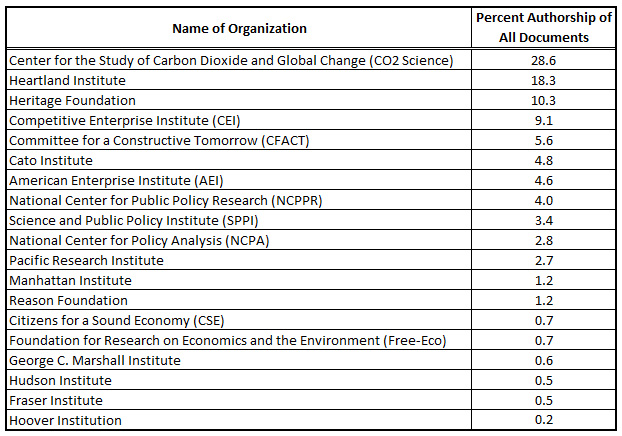| Tweet | Follow @co2science |
Paper Reviewed
Boussalis, C. and Coan, T.G. 2016. Text-mining the signals of climate change doubt. Global Environmental Change 36: 89-100.
Somewhat lamenting the inability of governments to implement comprehensive policies aimed at climate change mitigation, Boussalis and Coan (2016) set out to investigate the reason why this is the case.
The focus of their research led them to examine the role played by conservative think tanks (CTTs) in promoting climate skepticism, for according to the pair of researchers, these organizations play a central role "in obstructing national climate policy (Lahsen, 2008; Oreskes and Conway, 2010) and international climate change mitigation agreements (McCright and Dunlap, 2003)" by providing key counter-claims that challenge climate pseudo-science and obstruct climate policy.
In accomplishing their objective, Boussalis and Coan compiled what they say is "the largest corpus of climate sceptic literature to date, collecting over 16,000 documents from 19 CTTs over the period 1998-2013." The content of these documents was then analyzed by them in an effort "to shed light on the relative prevalence of science- and policy-related discussion among conservative think tanks."
As shown in the figure below, the results of that analysis reveal that no other CTT is as active as our organization in producing material to counter claims of climate alarmism. Indeed, over the period of study, nearly 29 percent of all climate-related documents produced by these think tanks were authored by our Center, which Boussalis and Coan describe as "one prolific science-oriented CTT ... which produces a steady stream of scientific review articles." And on that point, we further note that Boussalis and Coan subdivided each of the 16,000-plus documents they analyzed into one of five categories, including (1) op-eds, articles and blogs, (2) policy/science reports and analyses, (3) speech and interview transcripts, (4) press releases/open letters and (5) scientific reviews, the latter of which we deem to be the most important, in that they deal with physical and biological processes that either do or do not take place in the real world of nature, and that come to bear on the question of whether or not anthropogenic CO2 emissions are truly able to promote climatic and biological changes that many people consider to be detrimental to both nature and humanity. And in this fifth and most important category, our Center for the Study of Carbon Dioxide and Global Change produced 3,878 documents, or fully 99.3% of the total, over the sixteen year period of study. Clearly, therefore, if one wants to learn what the world's scientists who actually study and conduct experiments relative to real-world physical and biological processes think of climate-alarmist predictions of CO2-induced global warming and ocean acidification, CO2 Science (www.co2science.org) is the place to go, where new scientific reviews are uploaded almost every day of the year.

Figure 1. Percent of the total number of CTT documents examined by Boussalis and Coan (2016) over the period 1998-2013 by CTT organization.
The results of the Boussalis and Coan study are gratifying, for they reveal that no other CTT is generating as much science-based material to fight climate alarmism as is our Center. And the fact that our Center does so with a budget and personnel complement that are likely an order (or orders) of magnitude smaller than those of the eighteen other CTT organizations is exceptionally gratifying! And if we can accomplish all this with remarkably limited resources, imagine what we could achieve with expanded resources. To that end, please consider donating to our Center. We need your support to continue the vital work we do.
References
Lahsen, M. 2008. Experiences of modernity in the greenhouse: a cultural analysis of a physicist ''trio'' supporting the backlash against global warming. Global Environmental Change 18: 204-219.
McCright, A. and Dunlap, R. 2003. Defeating Kyoto: the conservative movement's impact on U.S. climate change policy. Social Problems 50: 348-373.
Oreskes, N. and Conway, E. 2010. Merchants of Doubt; How a Handful of Scientists Obscured the Truth on Issues from Tobacco Smoke to Global Warming. Bloomsbury, New York.
Posted 12 January 2016



